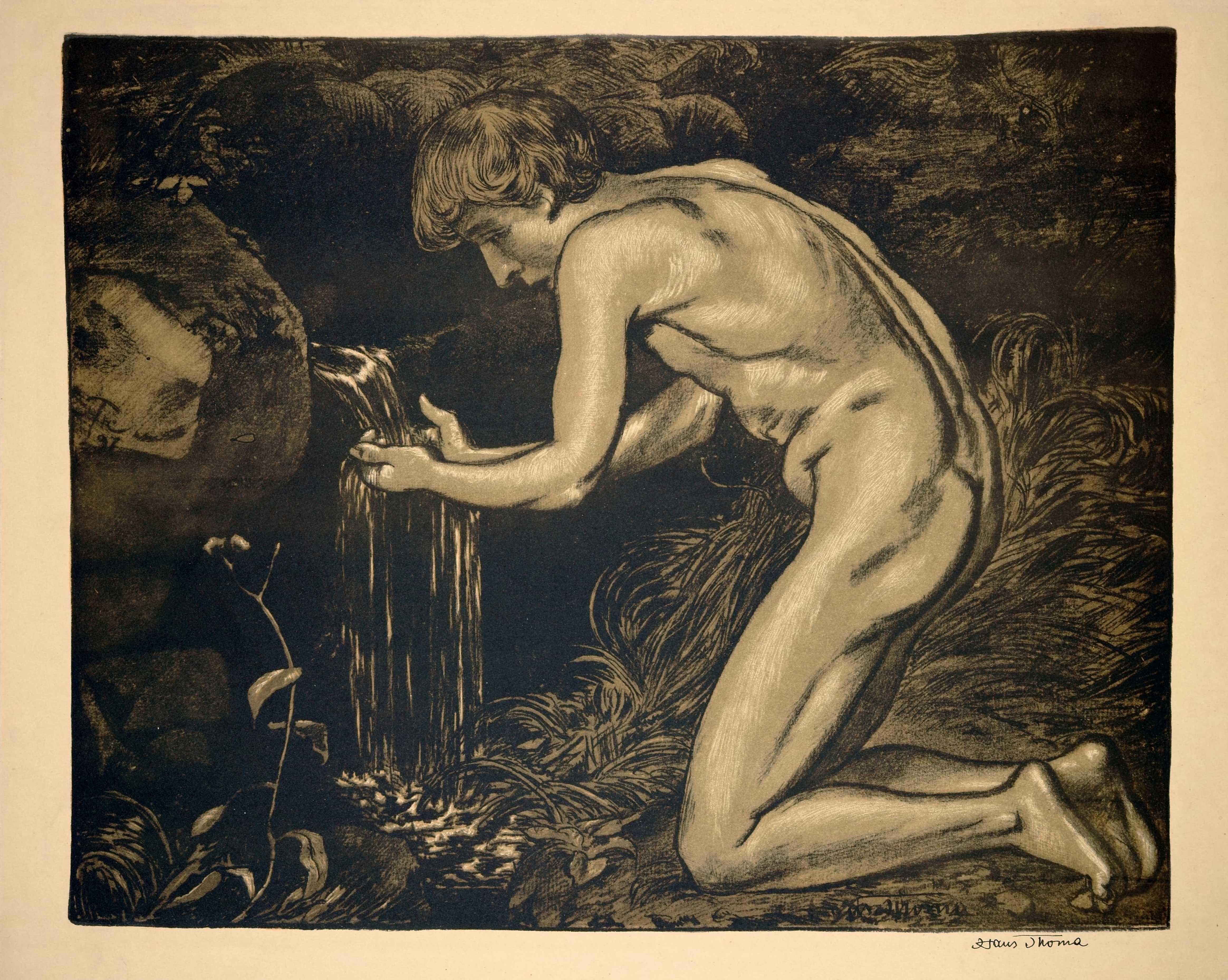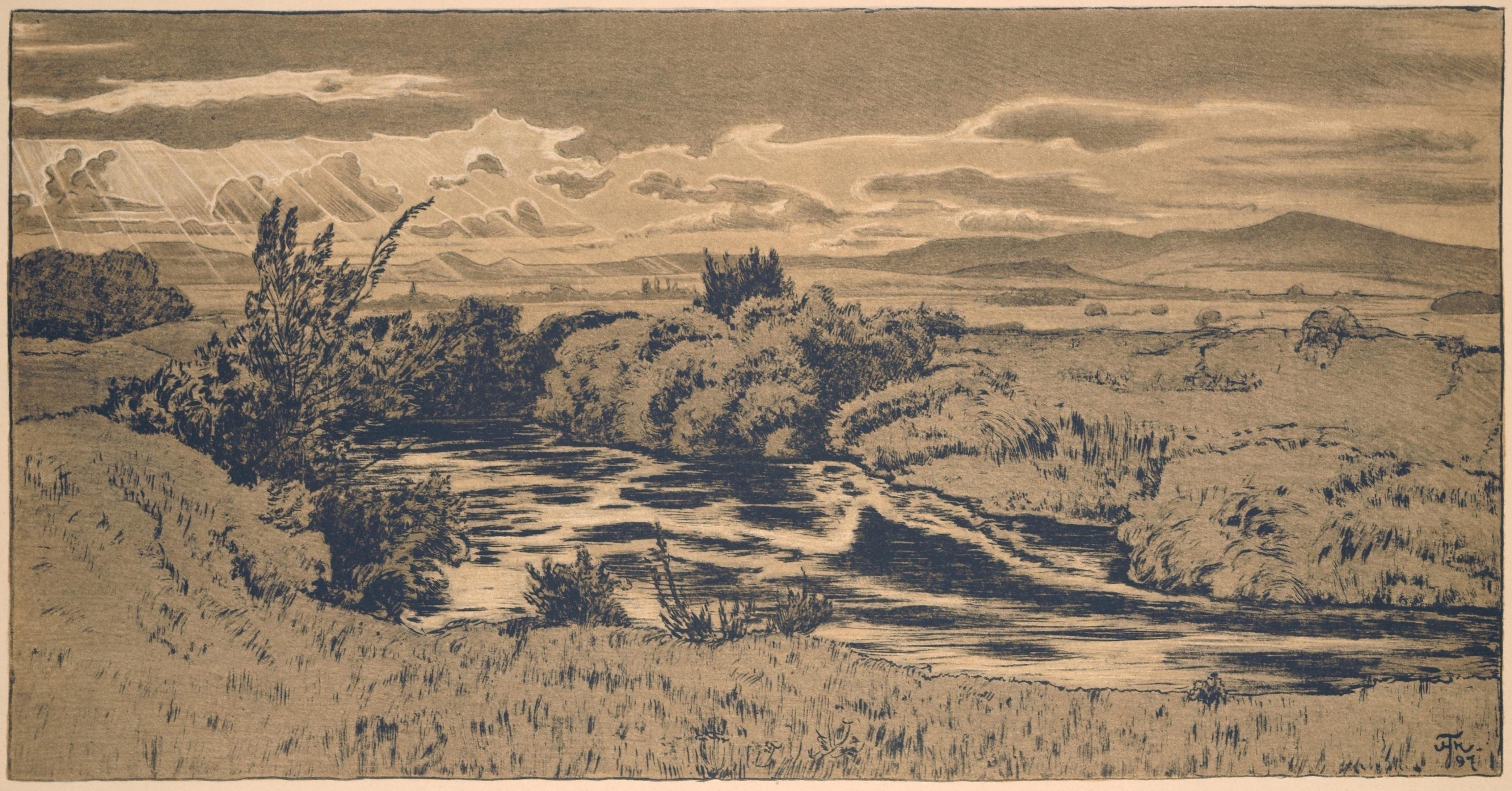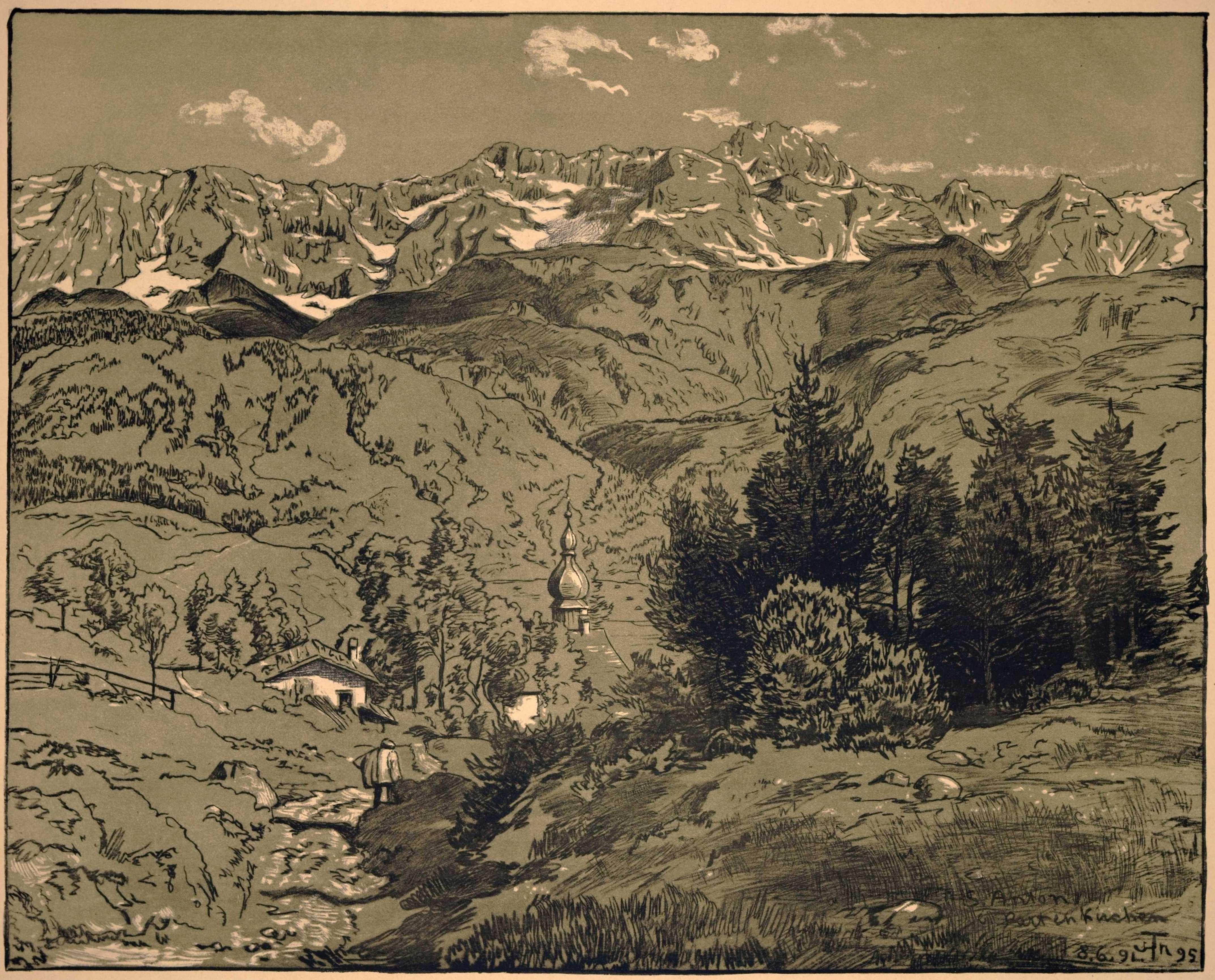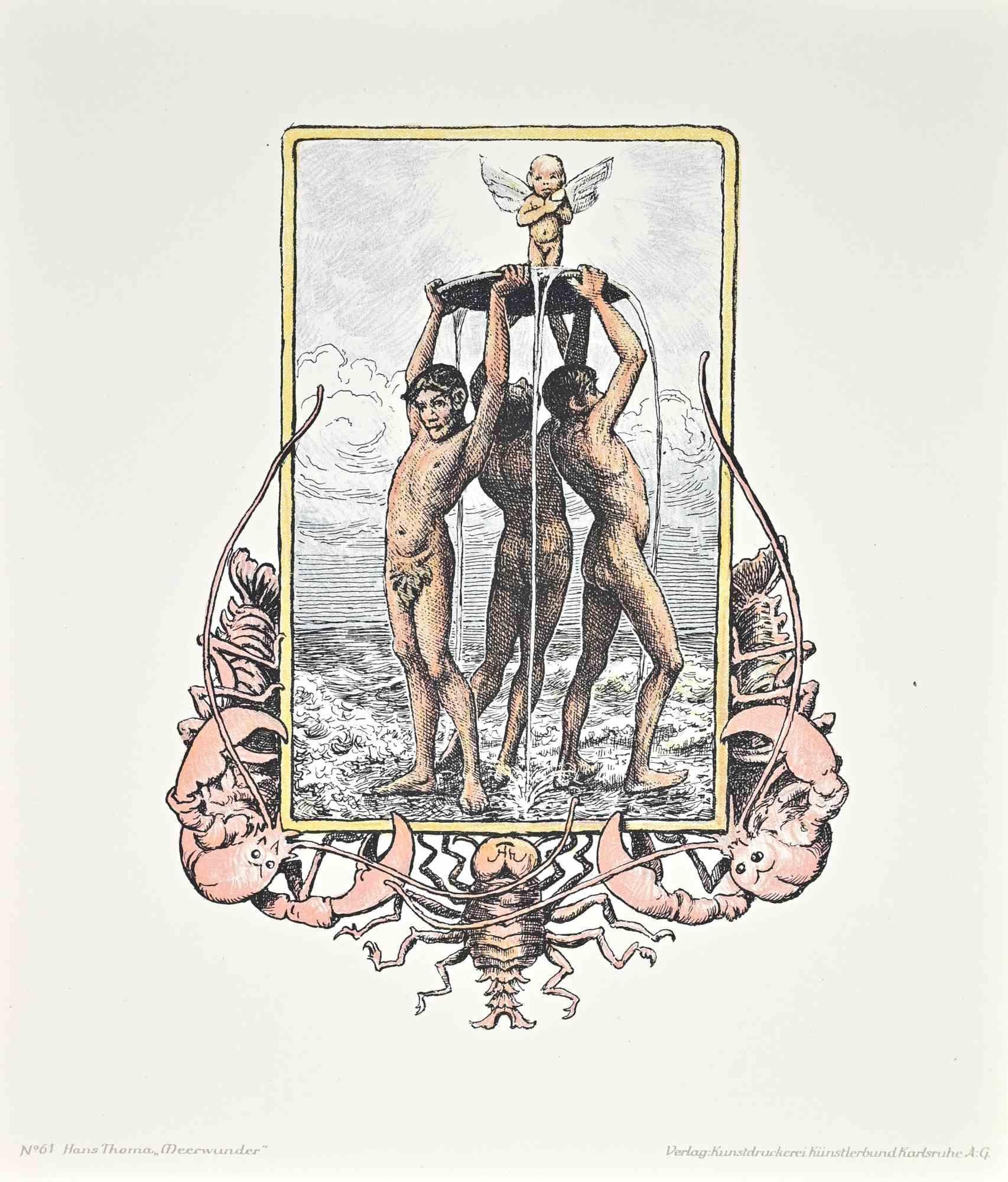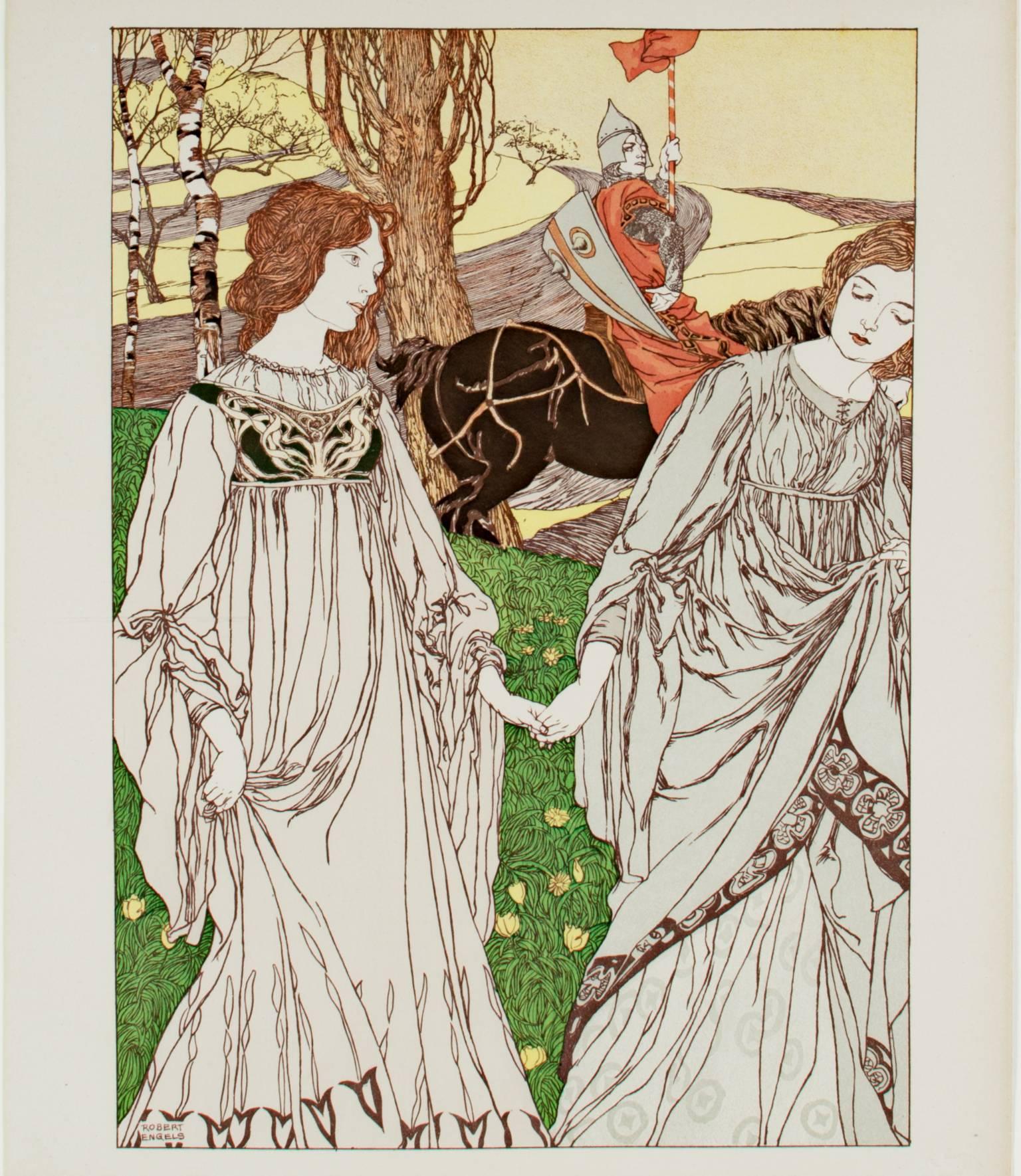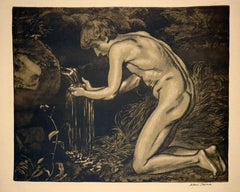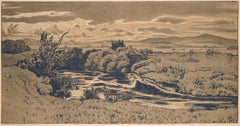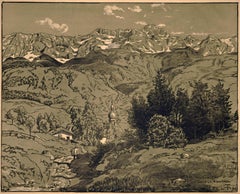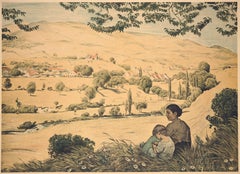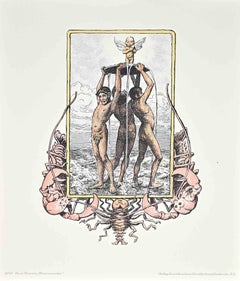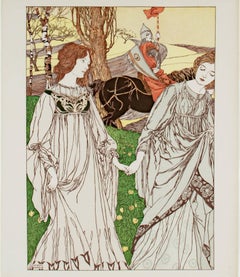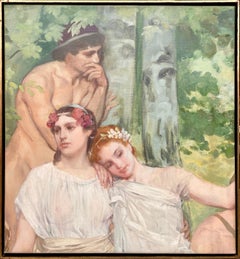Items Similar to Muse / - In the realm of the muses -
Want more images or videos?
Request additional images or videos from the seller
1 of 8
Hans ThomaMuse / - In the realm of the muses -1893
1893
$227.98
$284.9820% Off
£172.30
£215.3720% Off
€192
€24020% Off
CA$318.47
CA$398.0920% Off
A$346.46
A$433.0820% Off
CHF 182.82
CHF 228.5320% Off
MX$4,166.81
MX$5,208.5120% Off
NOK 2,306.24
NOK 2,882.8020% Off
SEK 2,146.32
SEK 2,682.9020% Off
DKK 1,462.60
DKK 1,828.2620% Off
About the Item
Hans Thoma (1839 Bernau - 1924 Karlsruhe), Muse, 1893. Algraph on strong wove paper, published by Breitkopf und Härtel in Leipzig as ‘Zeitgenössisches Kunstblatt Nr. 174’, 43.5 cm x 35 cm (image), 50 cm x 40 cm (sheet size), signed and dated on the left. Verso with publisher's label.
- Edges occasionally slightly bumped, otherwise in very good condition
- In the realm of the muses -
Euterpe, the muse of music and poetry, sits on the edge of a spring-fed body of water surrounded by a flower-covered meadow in the middle of the forest. Her horse stands where the forest seems to divide, focusing the scene entirely on the foreground. Hans Thoma was inspired to create this work by Philipp Otto Runge's painting Spring and Poet (1805). In Runge's work, the spring is the source of inspiration; here, however, it is the muse who is depicted as an inspiring force through the spring. The brightest figure in the picture, she gazes into the darkness of the water while striking the lute, listening for its sounds.
About the artist
After failing to complete his apprenticeship as a lithographer, painter and clockmaker, Hans Thoma trained as an autodidact painter. In 1859 he won a scholarship to the Karlsruhe Art School, where he became a student of Wilhelm Schirmer and Ludwig Des Coudres. After graduating in 1866, Thoma spent time in Basel and Düsseldorf. He met Otto Scholderer, with whom he traveled to Paris in 1868. There he was impressed by the art of Gustave Courbet and the Barbizon School. After his works were rejected by the Karlsruhe Kunstverein, Thoma moved to Munich in 1870, where he was close to the Leibl circle. Wilhelm Trüber worked for a time in Thoma's studio in Munich. In 1874 he made the first of a series of trips to Italy with the painter Albert Lang, where he met Hans von Marées and Adolph von Hildebrand and became friends with Arnold Böcklin, whose art made a lasting impression on Thoma. On his return to Munich, Thoma became a student of Cella Berteneder, whom he married in 1877.
Thoma traveled to England in 1879 at the invitation of art collector Charles Minoprio. Over the years, Minoprio acquired more than 60 oil paintings by Thoma and organized the first exhibition of his art abroad in Liverpool in 1884. Thoma had lived in Frankfurt since 1878. The following year, the Frankfurter Kunstverein organized the first solo exhibition of his work. After a trip to the Netherlands, Thoma moved to Kronberg im Taunus in 1899, where the Kronberg painters' colony was based. That same year he was appointed professor at the Karlsruhe Art School and director of the Karlsruhe Kunsthalle. In 1901, together with Wilhelm Süs, Hans Thoma founded the Grand Ducal Majolica Manufactory in Karlsruhe, for which he supplied designs from then on.
Thoma was now at the height of his artistic fame. The 1909 edition of Meyer's Großes Konversations-Lexikon noted that Thoma had become one of the German people's favorite painters. On the occasion of his 80th birthday in 1919, Ernst Oppler and Lovis Corinth organized a large celebration. After Thoma's death, the Berlin National Gallery dedicated a major exhibition to him in 1922, and the Basel Kunsthalle in 1924.
GERMAN VERSION
Hans Thoma (1839 Bernau - 1924 Karlsruhe), Muse, 1893. Algraphie auf kräftigem Velin, bei Breitkopf und Härtel in Leipzig als ‚Zeitgenössisches Kunstblatt Nr. 174‘ erschienen, 43,5 cm x 35 cm (Darstellung), 50 cm x 40 cm (Blattgröße), links mit Signet und Datierung versehen. Rückseitig mit Verlagsaufkleber.
- Kanten mitunter leicht bestoßen, ansonsten in sehr gutem Zustand
- Im Reich der Muse -
Die Muse der Musik und Lyrik, Euterpe, sitzt am Rande eines von einem Quellenlauf bewegten Gewässer, das, inmitten des Waldes, von einer blumenbewachsenen Wiese umgeben wird. Dort, wo sich der Wald zu teilen scheint, steht ihr Pferd, um die Szene ganz auf den Vordergrund zu konzentrieren. Zu seiner Darstellung hat sich Hans Thoma von Philipp Otto Runges Bild ‚Quelle und Dichter‘ (1805) anregen lassen. Ist bei Runge allerdings die Quelle der Quell der Inspiration, so ist es hier die Muse, die durch die Quelle als inspirierende Kraft zur Darstellung kommt. Sie ist die hellste Gestalt im Bild und schlägt, in das Dunkel des Wassers blickend, die Laute, deren Tönen sie nachzulauschen scheint.
zum Künstler
Nachdem er Lehren als Lithograph, Anstreicher und Uhrschildmaler abgebrochen hatte, bildete sich Hans Thoma autodidaktisch als Kunstmaler. Dies brachte ihm 1859 ein Stipendium für die Kunstschule in Karlsruhe ein, wo er Schüler von Wilhelm Schirmer und Ludwig Des Coudres wurde. Nach Abschluss des Studiums, 1866, hielt sich Thoma in Basel und Düsseldorf auf. Er lernte Otto Scholderer kennen, mit dem er 1868 nach Paris reiste. Dort beeindruckten ihn die Kunst Gustave Courbets und die Schule von Barbizon. Nach der Ablehnung seiner Werke im Karlsruher Kunstverein wurde Thoma 1870 in München ansässig, wo er dem Leibl-Kreis nahestand. In München arbeitete Wilhelm Trüber zeitweise in Thomas Atelier. 1874 erfolgte zusammen mit dem Maler Albert Lang die erster einer Reihe von Italienreisen, auf der er Hans von Marées und Adolph von Hildebrand kennenlernte und mit Arnold Böcklin Freundschaft schloss, dessen Kunst Thoma nachhaltig beeindruckte. Nach seiner Rückkehr nach München wurde Cella Berteneder Thomas Schülerin, die er 1877 ehelichte.
Auf Einladung des Kunstsammlers Charles Minoprio reiste Thoma 1879 nach England. Im Laufe der Jahre erwarb Minoprio mehr als 60 Ölbilder Thomas und veranstaltete 1884 die erste Auslandsausstellung seiner Kunst in Liverpool. Ab 1878 lebte Thoma in Frankfurt. Im Folgejahr zeigte der Frankfurter Kunstverein die erste Einzelausstellung seiner Werke. Nach einer Reise in die Niederlande zog Thoma 1899 nach Kronberg im Taunus, wo die Kronberger Malerkolonie ansässig war. Im selben Jahr wurde er zum Professor der Karlsruher Kunstschule und zum Direkter der Karlsruher Kunsthalle berufen. 1901 war Hans Thoma mit Wilhelm Süs Gründer der Großherzoglichen Majolika-Manufaktur Karlsruhe, für die er fortan Entwürfe lieferte.
Thoma stand nun auf dem Höhepunkt seines künstlerischen Ruhmes. Meyers Großes Konversations-Lexikon stellt in der 1909 erschienen Auflage fest, Thoma sei zu einem Lieblingsmaler des deutschen Volkes geworden. Anlässlich des 80. Geburtstags, 1919, organisierten Ernst Oppler und Lovis Corinth eine große Feierlichkeit. Nachdem Thoma verstorben war, widmete ihm die Berliner Nationalgalerie 1922 und die Basler Kunsthalle 1924 eine große Werkschau.
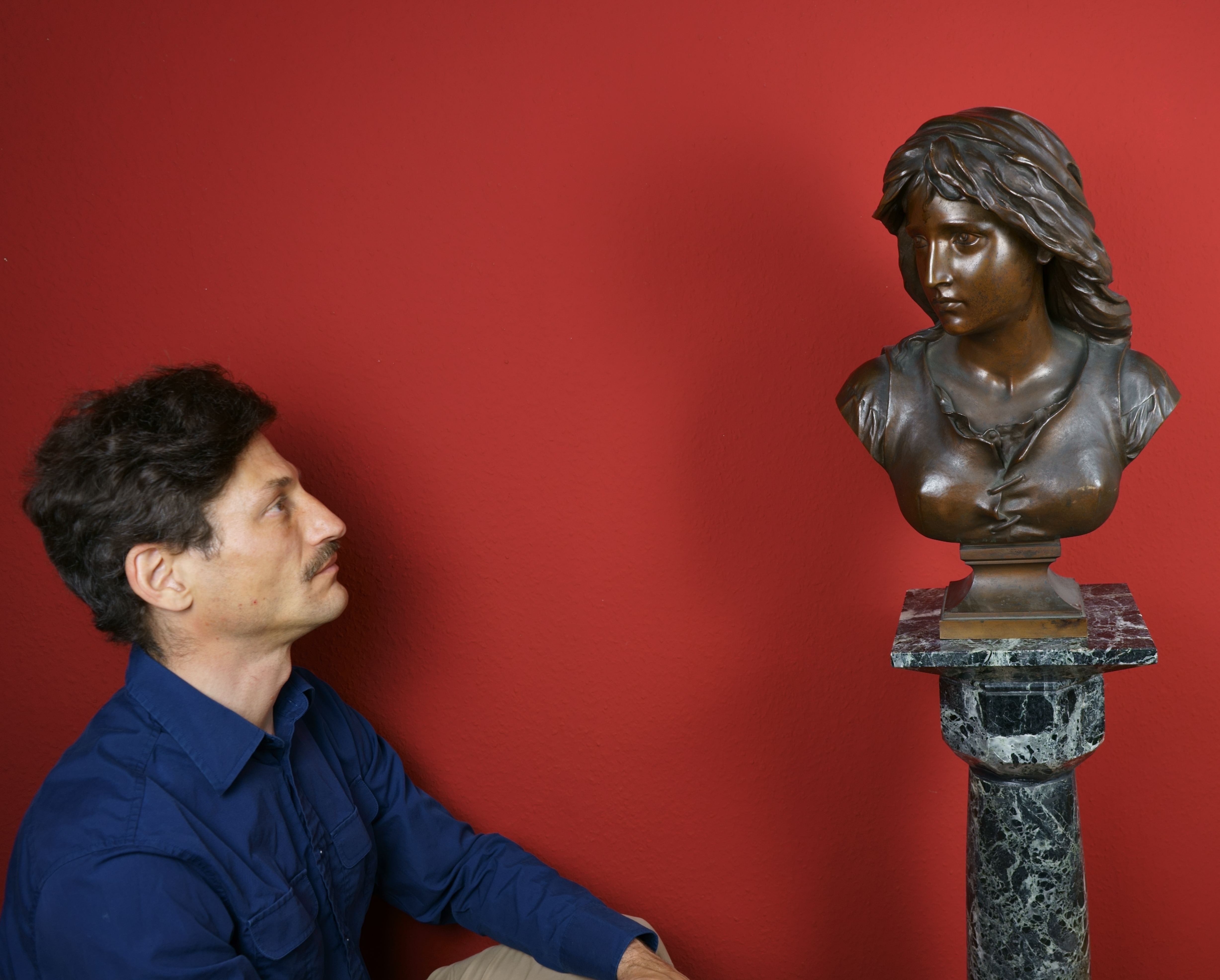
About the Seller
5.0
Vetted Professional Seller
Every seller passes strict standards for authenticity and reliability
Established in 2014
1stDibs seller since 2023
22 sales on 1stDibs
- ShippingRetrieving quote...Shipping from: Berlin, Germany
- Return Policy
More From This Seller
View AllBoy at the source / - Elixir of Life -
Located in Berlin, DE
Hans Thoma (1839 Bernau - 1924 Karlsruhe), Boy at the source, 1897. Algraph on strong wove paper after a drawing from 1897, published by Breitkopf und Härtel in Leipzig as ‘Zeitgenös...
Category
1890s Realist Figurative Prints
Materials
Paper
$265 Sale Price
20% Off
At the pond / - The longing of the landscape -
Located in Berlin, DE
Hans Thoma (1839 Bernau - 1924 Karlsruhe), At the pond, 1897. Algraph on strong wove paper, published by Breitkopf und Härtel in Leipzig as ‘Zeitgenössisches Kunstblatt Nr. 148’, 23....
Category
1890s Realist Figurative Prints
Materials
Paper
$180 Sale Price
20% Off
S. Anton Patenkirchen / - The Home of the Landscape -
Located in Berlin, DE
Hans Thoma (1839 Bernau - 1924 Karlsruhe), S. Anton Patenkirchen, 1895. Algraph on strong wove paper, published by Breitkopf und Härtel in Leipzig as ‘Zeitgenössisches Kunstblatt Nr....
Category
1890s Realist Figurative Prints
Materials
Paper
$180 Sale Price
20% Off
Southern German summer landscape / - The profile of the landscape -
Located in Berlin, DE
Hans Thoma (1839 Bernau - 1924 Karlsruhe), Southern German summer landscape, around 1897. Algraph on strong wove paper, published by Breitkopf und Härtel in Leipzig as ‘Zeitgenössisc...
Category
1890s Realist Figurative Prints
Materials
Paper
$180 Sale Price
20% Off
Adam and Eve / - United in Death -
Located in Berlin, DE
Hans Thoma (1839 Bernau - 1924 Karlsruhe), Adam and Eve, 1897. Algraph on strong wove paper, published by Breitkopf und Härtel in Leipzig as ‘Zeitgenössisches Kunstblatt Nr. 113’, 44...
Category
Early 1900s Realist Figurative Prints
Materials
Paper
$227 Sale Price
20% Off
Blessed are the spiritually poor / - The Abundance of Poverty -
Located in Berlin, DE
Rudolf Nehmer (1912 Bobersberg - 1983 Dresden), Blessed are the spiritually poor, 1948. Woodcut on yellowish wove paper, 20 cm x 15 cm (image), 45 cm x 30 cm (sheet size), signed “Ru...
Category
1940s Realist Figurative Prints
Materials
Woodcut
$180 Sale Price
20% Off
You May Also Like
Imperia (Caprices of Verlaine) - Original Lithograph 1899
Located in Paris, IDF
Alfred Pierre AGACHE (1843-1915)
Imperia (Caprices of Verlaine), 1899
Original lithograph (Champenois workshop)
Printed signature in the plate
On vellum, 40 x 31 cm (c. 16 x 12 in)
...
Category
1890s Art Nouveau Figurative Prints
Materials
Lithograph
Meerwunder - Lithograph by Hans Thoma - 1910 ca.
By Hans Thoma 1
Located in Roma, IT
Lithograph realized by Hans Thoma in 1910 ca.
Printed by Kunstlerbund Karlsruhe AG.
Not signed.
Very good condition.
Category
1910s Modern Figurative Drawings and Watercolors
Materials
Lithograph
"Le Passant, " Original Color Lithograph
By Robert Engels
Located in Milwaukee, WI
"Le Passant" is an original Art Nouveau color lithograph. It depicts two women in the foreground wearing medieval white robes and a knight passing behind them on a black horse. Features the L'Estampe Moderne blindstamp bottom right hand corner. 1898.
15 3/4" x 12" art
23" x 19 1/4" framed
Robert Engels studied in Dusseldorf and moved shortly thereafter to work in Munich. Later, he became a professor at a school of applied arts at the KGS in Munich. He created many decorative prints as well as stained glass windows and also created compositions to illustrate Joseph Bedier's rendition of "Tristan and Iseult...
Category
1890s Art Nouveau Figurative Prints
Materials
Lithograph
Romantic Portraits, Herman Richir, Brussels 1866 – 1942, Belgian Painter
Located in Knokke, BE
Romantic Portraits
Richir Herman
Brussels 1866 – 1942
Belgian Painter
Signature: Attributed to Richir Herman
Medium: Oil on canvas
Dimensions: Image size 67,50 x 62,50 cm, frame size 69,50 x 64,50 cm
Biography: Richir Herman Jean Joseph was born in Ixelles (Brussels), on November 4, 1866. He was a Belgian painter of portraits, still lifes, genre paintings, nudes and landscapes. He made decorative paintings to fit into private homes.
Richir mainly painted portraits. His clients usually belonged to the higher circles. He portrayed amongst others King Albert and Queen Elisabeth, Cardinal Mercier and Countess d’Oultremont. Less known are the landscape paintings he made Limburg and Kempen, where he regularly stayed with befriended artist Emile Van Doren (1865 – 1949).
Herman Richir first studied at the Sint-Joost-ten-Node Academy with Gustave Biot and Charles Hermans, continued his education at the Royal Academy of Fine Arts in Brussels (1884-1889) with the master teacher and artist Jean-Francois Portaels (1818 – 1895). In 1886, during his studies, he won second Prize of Rome for Painting.
Richir lived in Schaarbeek. In 1900 he became a teacher of drawing and in 1905 first teacher of painting after nature at the Brussels Academy. He was director there several times 1906-1907, 1910, 1911, 1915-1919, 1925-1927. He was retired in 1927.
His pupils included Albert Alleman (1892 – 1933), Éliane de Meuse (1899 – 1993), Paul Hagemans (1884 – 1959), Maurice Mareels (1893 – 1976), Guy Onkelinx (1879 – 1935), Georges Rogy (1897 – 1981), José Storie (1899 – 1961), Charles Swyncop (1895 – 1970), Maurice Schelck...
Category
20th Century Romantic Portrait Paintings
Materials
Canvas, Oil
Large Antique German Oil Canvas Hermann Frobenius Pre-Raphaelite Painting 1900
Located in Portland, OR
A Large and impressive antique oil on canvas Pre-Raphaelite painting by the German artist, Hermann Frobenius (1871-1954), signed and dated 1900.
Frobenius had classical training and studied both in Rome and Florence, he later was in the circle of Arnold Bocklin and Hans von Marees, he settle in Munich but also in Dresden briefly and latterly in Berlin. He, like many other European painters was fascinated with North Africa and painted many oriental scenes of Algiers, Tunis and Cairo, he was represented at many exhibitions, including the "Great German Art Exhibition" in Munich 1941.
This painting (an early example of the artist's work) is very finely painted in the Pre Raphaelite style, depicting a medieval costumed...
Category
Early 1900s Pre-Raphaelite Figurative Paintings
Materials
Canvas, Oil
Art Nouveau : Beauty of the Sea - Original lithograph - 1898
Located in Paris, IDF
Henri GUINIER
Art Nouveau : Beauty of the Sea, 1898
Original lithograph (Champenois workshop)
Printed signature in the plate
On vellum, 40 x 31 cm (c. 16 x 12 in)
INFORMATION: Lith...
Category
1890s Art Nouveau Figurative Prints
Materials
Lithograph
More Ways To Browse
Antique Kunst
Antique Invitations
Antique Lute
Antique Nun
Lang Antique
Wesselmann Foot
Western Airlines Poster
Whistler Original Print
William Greengrass
Winslow Homer Etchings
Zodiac Sign Hebrew
1790 Lithograph
1800s Vintage Dresses
1940s Vintage Pin Up Art
1972 Pontiac
1980s Vintage Museum Poster
Alec Monopoly Signed
Alex Katz Sarah
